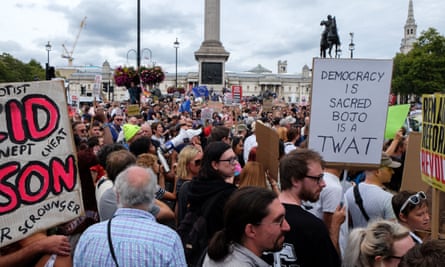Representative democracy is never easy. It’s been obvious for decades that the eight-word British constitution established in 1689 – what the crown assents in parliament is law – is a decaying, time-worn construct on which to protect and advance today’s democracy. It may have seemed “glorious” in the 17th century to hit upon the-then revolutionary notion that the crown can continue, but only if it delegates its monarchial sovereignty to whoever commands a majority in parliament. But it’s a wheeze that today too easily collapses into a highly centralised executive acting dictatorially because of its monarchial authority – and becomes toxic if that dictatorial dimension becomes legitimised by the “will of the people” in a referendum. A constitution with a bias to being an elective dictatorship, as Lord Hailsham famously characterised it, too easily slides into dictatorship by referendum.
It is only unwritten, uncodified understandings that protect the body politic from regressing to government with minimal checks, balances and accountability. They in turn depend upon a political class that, whatever its differences, accepts common rules of the game, especially making sure that any recourse to direct democracy by referendum is firmly subordinated to rule by parliament.
But any residual acceptance of common rules has been exploded by the passionate Brexiter conviction that their referendum victory empowers them to use any ruse available to achieve their goal, even a no-deal Brexit, against the scrutiny of a “Remain” parliament.
Last week, the scale of the weakness of Britain’s constitutional apparatus to obstruct gerrymandering was exposed to all. To prorogue parliament for no better reason than to avoid parliamentary scrutiny of a no-deal Brexit may have been an intolerable abuse of power, and an affront to democracy, but in Britain it is constitutionally possible. As a result, for all the threats of judicial review and court actions, it will be difficult, if not impossible, to challenge.
For the prime minister controls everything, from the business of the House of Commons to the ability to prorogue it. He or she is lent monarchial sovereignty, the same sovereignty that Charles 1 tried to justify because the monarch was supposedly God’s representative on Earth: the divine right of kings, now transmuted into the divine right of Boris. Part of the-then cleverness of the 17th-century deal was that it co-opted the crown into being the above-the-fray, holder-of-the-ring of proper parliamentary procedure and process. But today, that capacity has evaporated.
So when Jacob Rees-Mogg travelled to Balmoral last week to ask the Queen to prorogue parliament, there was virtually no prospect of her refusing – as an elected head of state might have done. She did have the option of saying that on such a controversial use of prerogative power she wanted to go beyond the minimum quorate of three for a privy council meeting (the chief whip and leader of the House of Lords accompanied Rees-Mogg on a separate plane to Balmoral to avoid suspicion) and call for a full meeting including former ministers from other parties, purportedly the constitutional forum to advise her on use of the royal prerogative. But that would have been seen as a political act. She folded. Exposed as a constitutional cipher, the case for an elected head of state has suddenly become unanswerable.
It is but one of the many constitutional earthquakes triggered by Brexit whose aftershocks will be felt for decades. Even the character of the referendum itself is testament to our lack of a constitution. No super-majority was required for this fundamental change in Britain’s relationship with Europe, any more than it was for the Scottish referendum: amazingly, a 42-year and a 300-year union could be ripped apart by a majority of one citizen’s vote. There were no requirements for Leave to spell out its case, the policing of how money was raised was feeble and there were no sanctions for outright misrepresentation.
Those countries that use referendums a lot, Switzerland and Ireland, for example, have elaborate rules for how they are conducted. In Britain, typically, there are no pre-agreed rules, just ad-hoc legislation arising from the particular power conjuncture of the day: the Cameron government on the run before its rightwing Eurosceptic zealots.
What is happening is the culmination of a rightwing coup that has deployed the weakness of Britain’s constitution to drive through toxic, divisive change, the manipulated will of the people trumping representative democracy. Yes, there were deep-set economic, social and cultural reasons behind the Leave vote, but it was British democratic arrangements that framed both the fact and character of the referendum.

The citizenry had become disillusioned with the parliamentary process, so that direct democracy seemed more democratic. And there were no obstacles to creating a rules-free, simple majority referendum.
To win then and now, those in favour of EU membership needed to recognise they had to trump the narrative of an undemocratic Europe by recognising more profound democratic failings at home. Balking at such radicalism, Remain instead found itself the advocate of a hard-to-justify status quo; an archaic state, a decaying democracy and rampant social inequality inflamed by fears of immigration. Leave was allowed to blame it all on the EU – cover for their ultra-rightwing ambitions.
A wholesale change of mindset was needed. Remain should have stood for a re-democratised Britain that put power in the hands of the people and for transformative economic and social change that would make Britain better, not worse. To leave the EU, it should have said, would be to abandon that prospect.
To succeed with this message required the Labour party to take it to its heart. It had to understand that Brexit was an ultra-rightwing project, to own EU membership, to understand the necessity of fashioning a fit-for-purpose constitution and to marry that with a powerful case for remaking economy and society to benefit the mass of the British. All combine to make the Remain case.
But the British left has never owned the case for a constitutional reset. Jeremy Corbyn can’t authentically criticise the divine right of Boris when he wants to be a no less divine Jeremy, legislating to create British socialism with little or no constraint, one of the reasons even liberal anti-no-deal Tories are so terrified of making common cause with him. In the left wing conception constitutions, after all, are bourgeois constructs to serve the interests of the ruling class. The world of checks, balances, organising a federal Britain to keep Scotland in the union, electing our head of state, creating a fair voting system and pre-agreeing the terms on which referenda are held are dismissed as the preoccupations of liberal, middle-class intellectuals. The 2017 Labour manifesto’s call for a constitutional convention, only to “consult” and “consider the option of a more federalised country”, feels and was but an afterthought.
Last week demonstrated that instead the constitution is fundamental. Corbyn was right: in the British system, the only surefire way to stop a no-deal Brexit is to establish an interim government in control of parliament and its agenda, extend the 31 October deadline and then hold an election paving the way for a referendum in which Remain will be an option. Abandoning that strategy and attempting to muster a Commons majority legislating against no deal – although the best option if there is no guarantee of winning a vote of no-confidence – is second best and full of risk.
After last week’s events, which enraged the bravest and best in the Tory party, Corbyn has a chance to build on the emerging coalition for legislation and make his offer again, but copper-bottoming it constitutionally as an alternative to Johnson. As interim prime minister, he will exercise no prerogative power, introduce no new policies, wholly respect every constitutional protocol and commit to hold a fully-fledged constitutional convention after the election.
He needs no more than a dozen Conservative MPs to agree – and such commitments may give them the cover they need. Ken Clarke is almost there; others are close. As the government tomorrow launches its £100m prepare for no deal national advertising campaign, alerting the public to the prospect of imminent mayhem, it is make-up-your-mind time for everyone. The atmosphere will darken. Johnson and Cummings thought proroguing was a clever wheeze. Instead, it has given the opponents of no deal the opening not just to block no deal by law, but oust the divine charlatan and his rancid cabal. The opportunity must be seized.

